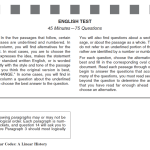Master Your Exam Preparation: 8 Letters To Success
Exam Preparation 8 Letters: Unlocking Success in Your Exams
Introduction
Hello Readers,
1 Picture Gallery: Master Your Exam Preparation: 8 Letters To Success

Welcome to a comprehensive guide on exam preparation, specifically focusing on the 8 letters that can unlock your success in exams. Whether you are a high school student preparing for your final exams or a college student aiming for top grades, this article will provide you with valuable insights and strategies to enhance your preparation and achieve your desired results.

Image Source: letslearnenglish.com
Exams can often be a source of stress and anxiety, but with the right approach and preparation, you can confidently tackle any exam that comes your way. Let’s delve into the world of exam preparation and discover how these 8 letters can make a significant difference in your academic journey.
The 8 Letters: W-H-A-T, W-H-O, W-H-E-N, W-H-E-R-E, W-H-Y, and H-O-W
What is Exam Preparation?
Exam preparation refers to the process of getting ready for an upcoming exam by studying and revising the relevant material. It involves reviewing course materials, organizing study resources, and implementing effective study techniques to optimize your learning and retention.
💡 Key Points:
Understanding the purpose and content of the exam
Identifying the topics and concepts to be covered
Gathering study materials and resources
Who Should Prepare for Exams?
Exam preparation is essential for students of all levels, from primary school to university. Whether you are a full-time student or a working professional pursuing further education, preparing for exams is a crucial component of academic success. Regardless of your background or field of study, investing time and effort into exam preparation can significantly improve your performance.
💡 Key Points:
Students at various educational levels
Working professionals pursuing further education
Individuals seeking academic advancement
When to Start Exam Preparation?
The timing of exam preparation plays a vital role in achieving optimal results. Starting early allows for better understanding and retention of the material, reduces stress, and enables ample time for revision. The ideal time to begin exam preparation varies based on factors such as the complexity of the subjects, the exam date, and personal study preferences.
💡 Key Points:
Consider the exam date and duration
Assess the complexity of the subjects
Personal study preferences and habits
Where to Focus During Exam Preparation?
Determining the focus areas during exam preparation is crucial for optimizing your efforts. Understand the exam syllabus or curriculum to identify the key topics and concepts that carry substantial weightage in the exam. Allocate more time to these areas while ensuring a balanced approach to cover the entire syllabus.
💡 Key Points:
Analyze the exam syllabus or curriculum
Identify key topics and concepts
Create a study plan with appropriate time allocation
Why Is Exam Preparation Important?
Exam preparation is essential for several reasons. It helps you gain a deeper understanding of the subject matter, improves your problem-solving skills, boosts your confidence, and enhances your chances of achieving better grades. Adequate preparation also reduces anxiety and allows you to approach the exam with a calm and focused mindset.
💡 Key Points:
Gain a deeper understanding of the subject matter
Develop problem-solving and critical thinking skills
Boost confidence and reduce anxiety
How to Prepare Effectively for Exams?
Preparing effectively for exams requires a well-planned approach and the implementation of proven strategies. Some effective techniques include creating a study schedule, breaking down the material into manageable chunks, using mnemonic devices, practicing with past papers, seeking clarification when needed, and taking care of your physical and mental well-being.
💡 Key Points:
Create a study schedule and stick to it
Break down the material into manageable chunks
Utilize mnemonic devices for better retention
Practice with past papers and sample questions
Seek clarification from teachers or peers
Take care of your physical and mental well-being
Advantages and Disadvantages of Exam Preparation
Advantages of Exam Preparation
1. Enhanced Performance: Effective exam preparation leads to improved performance and higher grades.
2. Increased Confidence: Thorough preparation boosts confidence levels, allowing you to approach exams with a positive mindset.
3. Better Time Management: Exam preparation helps you develop valuable time management skills, ensuring efficient use of study time.
4. Improved Retention: Regular revision and practice enhance your ability to retain and recall information during exams.
5. Overcoming Anxiety: Adequate preparation reduces exam-related stress and anxiety, enabling you to perform at your best.
Disadvantages of Exam Preparation
1. Overemphasis on Grades: Excessive focus on exam preparation can lead to a narrow perspective, neglecting holistic learning.
2. Stress and Pressure: Preparing for exams can sometimes be stressful, especially when handling multiple subjects simultaneously.
3. Lack of Creativity: The emphasis on factual recall in exams may limit opportunities for creative thinking and problem-solving.
4. Inefficient Study Techniques: Poor study strategies can hinder effective exam preparation, resulting in subpar performance.
5. Anxiety and Performance Pressure: Some individuals may experience heightened anxiety and performance pressure during exams, impacting their overall performance.
Frequently Asked Questions (FAQs)
1. How can I manage my time effectively during exam preparation?
Managing time effectively during exam preparation requires creating a study schedule, prioritizing tasks, and maintaining a balance between study and relaxation.
2. Is it better to study alone or in a group for exams?
Both studying alone and in a group have their advantages. It depends on your learning style and preferences. Experiment with both approaches to determine what works best for you.
3. How can I overcome exam-related anxiety?
To overcome exam-related anxiety, practice relaxation techniques, maintain a healthy lifestyle, seek support from friends and family, and adopt positive self-talk.
4. Is cramming an effective study technique for exams?
Cramming is generally not recommended as it promotes short-term memory retention. It is more beneficial to engage in regular, spaced-out revision for long-term retention of information.
5. What should I do if I feel overwhelmed during exam preparation?
If you feel overwhelmed during exam preparation, take a break, practice self-care, seek support from teachers or mentors, and break down tasks into smaller, manageable chunks.
Conclusion
Friends, effective exam preparation is the key to unlocking success in your exams. By understanding the importance of preparation, implementing proven strategies, and managing your time effectively, you can confidently face any exam and achieve your desired results. Remember to focus on understanding the concepts, practicing regularly, and taking care of your well-being. Embrace the power of these 8 letters in your exam preparation journey, and let them pave the way for your academic success.
Final Remarks
In conclusion, exam preparation is a critical aspect of academic achievement. However, it is important to remember that success goes beyond exam results. Learning is a lifelong process, and exams are just one way to assess your knowledge and abilities. Embrace a growth mindset, prioritize holistic learning, and constantly strive for personal and intellectual growth. May your exam preparation be fruitful, and may you achieve success not only in exams but also in all aspects of your educational journey.
This post topic: Study Techniques


